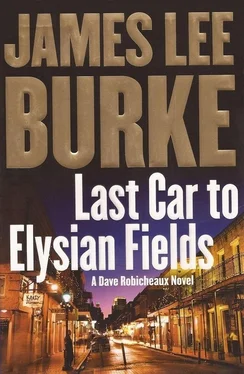Just before I started to drive out to the daiquiri store at the four corners on Loreauville Road, the phone rang on my desk. It was the administrative assistant in the warden’s office at Angola Penitentiary, the same man who had hung up on me when I had mentioned the possibility of Junior Crudup being buried under the levee along the Mississippi River.
“I did some digging around,” he said.
I laughed into the receiver.
“You think this is funny?” he said.
“No, sir. I’m sorry.”
“Ever know an old gun hack by the name of Buttermilk Strunk?”
“Cain’t-See to Cain’t-See Double-Time Strunk?” I said.
“That’s the man. He was working levee gangs from Camp A in 1951. He says Crudup was a big stripe back then and on the shit list of a couple other gun bulls who wanted to make a Christian out of him, get my meaning?”
“I think so,” I said.
“They worked him over pretty bad. Strunk says that’s about the time a man came to the penitentiary and made recordings of some of the convicts. According to Strunk, this man probably saved Crudup’s life.”
“You mean John or Allen Lomax, the folk music collectors?”
“No, this guy lives in Franklin. You ought to know him. He only owns about half the goddamn state.”
“Who are we talking about?” I said, my impatience growing.
“Castille LeJeune. Strunk says LeJeune came to Angola with a man from a record company and got Crudup pulled off the levee gang. He doesn’t know what happened to him after that... You still there?”
“Castille LeJeune saved the life of a black convict? I’m having a hard time putting this together.”
“Why’s that?”
“He’s supposed to be a sonofabitch.”
“Remind me not to waste my time on bullshit like this again,” the administrative assistant said.
That night my old enemy was back. According to his friends, Audie Murphy fashioned a bedroom out of his garage in the hills overlooking Los Angeles and slept separately from his wife, a loaded army-issue .45 under his pillow. After World War II he had become convinced that, before he could sleep a full night again, he would have to spend five days in peacetime for every day he had spent on the firing line. For him that meant twenty years of sleeplessness.
I couldn’t offer my limited experience in Vietnam as the raison d’etre for my insomnia. I drank before I went there and I drank more when I came back. Now I did not drink at all and my nocturnal hours were still filled with the same visitors and feelings; they simply took on different shapes and faces.
The night seemed alive with sound the clatter of red squirrels on the roof, a dredge boat out on the bayou, a brief rain shower that swept across the trees in the yard. When I finally fell asleep I dreamed of my dead wife Bootsie and Father Jimmie Dolan and the three girls who had died in a burning automobile and of a Negro convict who had been ground up in a system that loathed courage in a black man.
What were the dreams really about? An imperfect world, I suspect, one over which death and injustice often seemed to hold dominion. But what kind of fool would surrender his sleep over a condition he could not change?
Sleeping with a .45 did not bring Audie Murphy peace of mind, nor did gambling away millions in Las Vegas. I had slept with firearms, too, and invested substantial sums of money in the parimutuel industry at racetracks all over the country, but I was no more successful in my attempt at redress with the world than he was. That said, I did have an answer for insomnia, one that was surefire and one that Murphy evidently did not try. But just the thought of its coming back into my life made sweat pop on my forehead.
When I went to the office in the morning a faxed message was waiting for me from the Department of Public Safety and Corrections in Baton Rouge. Since there was no record of Junior Crudup’s discharge from Angola or his death while on the farm, it was the department contention he had served his full sentence and gone out “max time,” which meant he would have been released without parole stipulations or supervision sometime in 1958.
It was pure blather.
I called Father Jimmie Dolan at his rectory in New Orleans and was told he was working in the garden. Fat Sammy had said Father Jimmie was a global-size pain in the ass. The archdiocese must have felt the same.
He had been assigned to an ancient, downtown church in a dirty, dilapidated neighborhood off Canal, where Mass was still said in Latin, women in the pews covered their heads, and communicants knelt at the altar rail when they received the Eucharist, as though the 1960s reforms of Vatican II had never taken place.
Last year, when I remarked to Father Jimmie on the obvious bad judgment if not punitive intention on the part of the diocese in placing a minister such as himself in a parish with an anachronistic mindset, he replied, “Some people can’t accept change. So the church lets a few wall themselves up in a mausoleum and pretend the past is still alive. Know anybody else who has that kind of problem?”
“Excuse me?” I said.
“They’re not bad guys,” he said, grinning from ear to ear.
My mind came back to the present and I heard Father Jimmie scrape the phone receiver off a hard surface.
“Fat Sammy Figorelli says you punched out the owner of a health salon,” I said.
“Not exactly.”
“How ‘not exactly’?”
“The guy we’re talking about runs a massage parlor and escort service. He forced a seventeen-year-old Vietnamese girl from our parish to give a blowjob to one of his customers. Is this why you called?”
“The Department of Corrections says Junior Crudup’s last sentence was up in 1958. They say he wasn’t paroled and he didn’t die inside the prison, so he must have gone out max time in ‘58.”
“He was probably killed and buried on the farm. But I doubt if we’ll ever know.”
“There’s more. An old time gun bull says a man by the name of Castille LeJeune got Junior off the levee gang around 1951. But that’s where the trail ends.”
“Castille LeJeune, in Franklin? That’s Theodosha Flannigan’s father.
She’s married to Merchie Flannigan.”
“How’d you know that?” I said.
“She used to live in New Orleans. She was one of our parishioners. Can we have a talk with Mr. LeJeune?”
“I don’t like to get too close to Theodosha.”
There was a beat, then he said, “Oh, I see.”
Way to go, Robicheaux, I thought.
That afternoon I went to each drive-by daiquiri store in New Iberia. Each of the stores used the same type of blue plastic cups that I had picked up near the accident scene, the same type lids, the same type sealing wrap. I showed each of the clerks working the window the yearbook photographs of the three girls killed on Loreauville Road. Each clerk looked at them blankly and shook his head. At the first three stores I believed the denials given me by the clerks. At the fourth my experience was different.
The store was a boxlike, plywood structure, painted white, located inside an oak grove just outside the city limits. I parked my cruiser in the trees and waited in the shade while the clerk, a kid probably not much over legal age himself, serviced three drive-by customers.
Then I walked to the window, which had a flap on it propped up by a stick. I opened my badge on him.
“What’s your name?” I said.
“Josh Comeaux.”
“You work here every evening, Josh?”
“Yes, sir. Unless I have a basketball game. Then Mr. Hebert lets me off,” he answered.
I flipped the high school yearbook open to a marked page and showed him pictures of two of the dead girls.
“You know either one of these girls?” I asked.
Читать дальше












